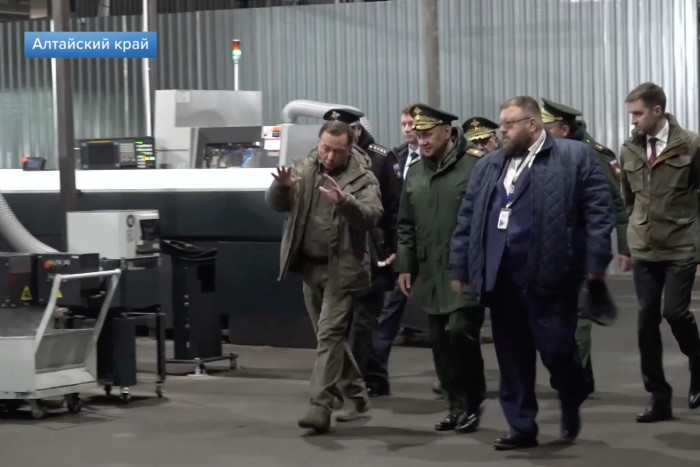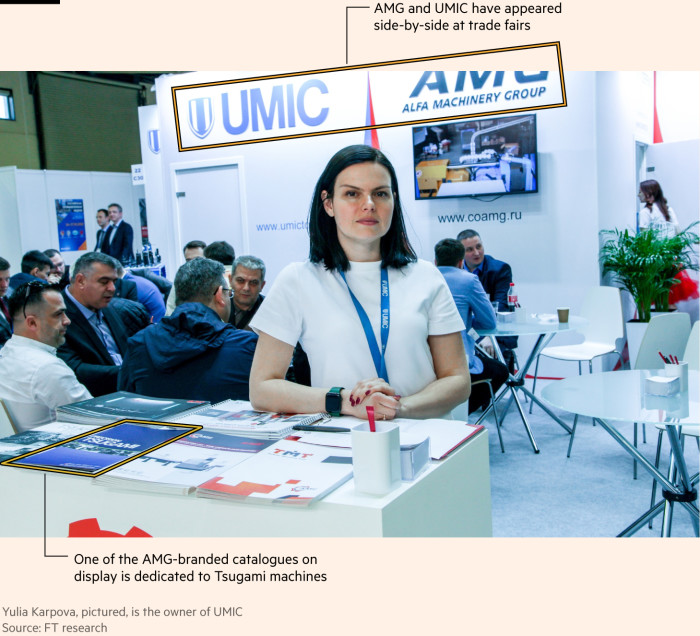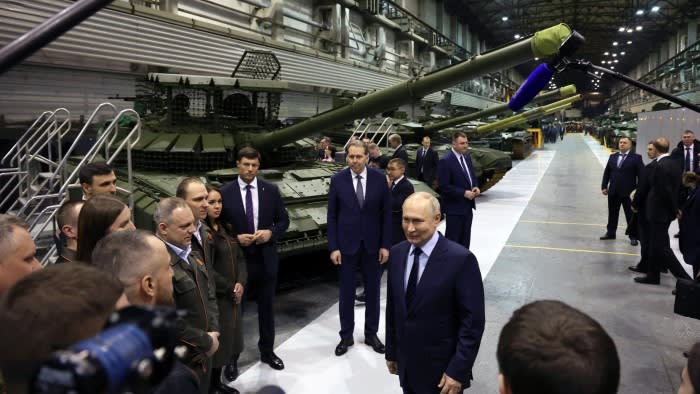Russia is scouring China for second-hand machine tools using shadowy buyer networks, as the Kremlin races to acquire crucial equipment to boost weapons production.
Moscow’s covert strategy for acquiring precision machinery, uncovered by investigators, seeks to circumvent increasingly restrictive Western sanctions and export controls aimed at hampering production for the military.
The operations, which run through networks of opaque companies, use a stock of older, high-quality machine tools from Western companies, which remain in China after decades of sales to local factories.
The Center for Advanced Defense Studies (C4ADS), a Washington-based think tank that has been mapping the shadow trade, said the complex procurement arrangements suggested Moscow’s claims about production of high-precision tools in Russia were likely “exaggerated”.
Allen Maggard, the C4ADS analyst who led the report on the machine tools, said Russian weapons makers were “trying to expand their production capabilities with whatever they could get their hands on.”
One purchasing network, identified by C4ADS and verified by the Financial Times, is based on a Moscow-based company called AMG, a Russian military supplier that the US placed under sanctions last year.
Since Russia’s invasion of Ukraine in 2022, AMG has increased imports of CNC (computer numerical control) tools made by Tsugami, a high-end Japanese machine manufacturer based in Tokyo. CNC tools are essential for the defense of industrial work because they allow automated, highly accurate and fast manipulation and milling of metal.
Public records show that AMG has contracts to obtain machine tools for Kometa, a company that develops weapons systems for Russia, including ballistic missile defense systems, beam weapons and missile systems, according to sanctions lists.
Tsugami machines have been identified in use at several military facilities. Sergei Shoigu, then Russia’s defense minister, was seen on state television in March in front of what appears to be a Tsugami machine at a factory in Altai that makes parts for cruise missiles.
Customs documents show that AMG purchased approximately $600,000 worth of Tsugami equipment from an official Japanese supplier in 2021. Purchases increased after the invasion to $50 million by 2023, with the entire increase coming from two shadowy middlemen.
The first supplier Amegino is a US-sanctioned supplier based in the UAE, whose website was originally hosted on servers in Russia. The owner is Andrey Mironov, according to Diligencia, a business information company; no other details are available about Mironov’s background.
The second is ELE Technology, which fraudulently presents itself as “a division of Gray Machinery Company,” a US machine tool distributor.
ELE’s website – which appears to have been lifted from the real Gray Machinery website – claims it has a warehouse in Illinois and offers lifts from Chicago O’Hare Airport for potential customers. The site claims that Glenn and Jared Gray, two experienced American CNC traders, are members of their team.
But ELE Technology is actually located 12,000 kilometers away, in Shenzhen, China. Glenn Gray, whose full biography and image are on the ELE website, told the FT he knew nothing about the company.
Website records and old publicity material suggest that ELE is run by a Chinese electronics trader named Benson Zeng. Zeng did not respond to requests for comment.

Tsugami told the FT that it has not supplied goods directly to ELE. According to ELE’s website, it currently sells two second-hand Tsugami machines, which were made in 2001 and 2005.
“We see decades-old machine tools being imported into Russia,” says Maggard. “This indicates a lack of compliance in the second-hand market, not to mention the fact that manufacturers are unlikely to worry about where their products end up after they are sold.
“Just because a machining center is 20 to 30 years old doesn’t mean it isn’t capable of producing simple parts for weapons.”
The two companies play different roles in the Russian purchasing operation. Amegino is a broker that commissions Chinese suppliers such as ELE to ship goods from China to Russia. The two have worked together: documents secured by C4ADS show that Amegino arranged for ELE to ship $2.7 million worth of goods to Russia in early 2023.
Tsugami has been relying on the Chinese market for about twenty years. One person associated with the company estimated that there are more than 100,000 Tsugami machines in China, out of 200,000 worldwide. It is a pool that Moscow has been targeting since the official suppliers of Tsugami machines withdrew from Russia in 2022.
“Before the pandemic, Tsugami had sought to take advantage of China’s national strategy to become a manufacturing superpower,” said an investment security analyst who inspected its facilities in China. By 2023, more than 60 percent of Tsugami’s sales took place in China.
But the volume of machinery in China is not just an export control problem for Tsugami. Customs records show that another Russian company, UMIC, has purchased $2.9 million worth of machine tools and parts made in countries including Israel, Japan, Korea, Germany, Sweden and Switzerland. In all cases, the equipment was shipped from China and purchased in yuan through trading partners in China.

Unlike AMG, UMIC is not sanctioned by the US. The owner of UMIC, Yulia Karpova, shares a married surname and phone number with Evgeny Karpov, the owner of AMG.
She has appeared at Russian fairs promoting AMG materials by joining AMG-UMIC stalls. In May 2022, after Japan lifted export controls, she was photographed holding AMG brochures advertising the range of Tsugami products that AMG claimed it could obtain.
UMIC and AMG did not respond to comment.
Japan’s Commerce Ministry said it is working with G7 partners to strengthen measures to combat sanctions circumvention. “While many countries struggle to deal with second-hand products, Japan is collecting a variety of information, including bypass companies,” the ministry said. “We would add them to the list of sanctioned entities if necessary.”
